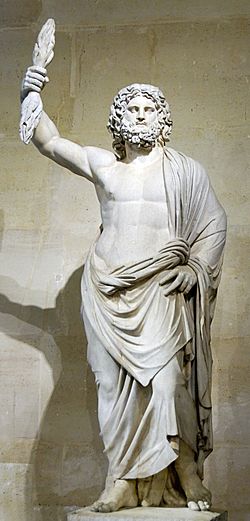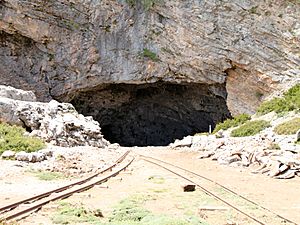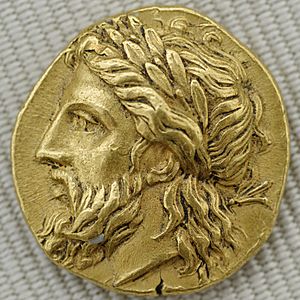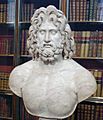Zeus facts for kids
Quick facts for kids Zeus |
|
|---|---|
| God of the sky, lightning, thunder, law, order, and justice | |

Zeus de Smyrne, discovered in Smyrna in 1680
|
|
| Abode | Mount Olympus |
| Symbol | Thunderbolt, eagle, bull, and oak |
| Personal information | |
| Consort | Hera and various others |
| Children | Aeacus, Agdistis, Angelos, Apollo, Ares, Artemis, Athena, Dionysus, Eileithyia, Enyo, Epaphus Eris, Ersa, Hebe, Helen of Troy, Hephaestus, Heracles, Hermes, Lacedaemon Minos, Pandia, Persephone, Perseus, Rhadamanthus, the Graces, the Horae, the Litae, the Muses, the Moirai |
| Parents | Cronus and Rhea |
| Siblings | Hestia, Hades, Hera, Poseidon, Demeter, Chiron |
| Roman equivalent | Jupiter |
| Norse equivalent | Thor or Odin |
| Slavic equivalent | Perun |
Zeus is the god of the sky, lightning and the thunder in Ancient Greek religion and legends, and ruler of all the gods on Mount Olympus. Zeus is the sixth child of Cronos and Rhea, king and queen of the Titans. His father, Cronos, swallowed his children as soon as they were born for fear of a prophecy which foretold that one of them would overthrow him. When Zeus was born, Rhea hid him in a cave on Mount Ida in Crete, giving Cronos a stone wrapped in swaddling clothes to swallow instead.
When Zeus was older he went to free his brothers and sisters; together with their allies, the Hekatonkheires and the Elder Cyclopes, Zeus and his siblings fought against the Titans in a ten-year war known as the Titanomachy. At the end of the war, Zeus took Cronos' scythe and cut him into pieces, throwing his remains into Tartarus. He then became the king of gods.
The supreme deity of the Greek pantheon, Zeus was universally respected and revered throughout Ancient Greece; the ancient Olympic Games were held at the site of Olympia every four years in honor of him. Highly temperamental, Zeus was armed with the mighty thunderbolt, said to be the most powerful weapon among the gods.
Zeus was married to his sister, Hera.
Zeus was known for throwing thunderbolts at people.
The god of honor and justice, Zeus was the one who both established and enforced law, and served as the standard for kings to follow, ensuring they did not abuse the power of their position.
His symbols were the thunderbolt, a sceptre, and oak tree, and the eagle and bull were his sacred animals. His Roman equivalent is Jupiter. Zeus was the strongest Greek god, the ruler of all gods. In Norse, Zeus is Odin.
Mythology
Birth
Cronus and Rhea had several children: Hestia, Demeter, Hera, Hades, and Poseidon, but swallowed them all as soon as they were born, since he had learned from Gaia and Uranus that he was destined to be overthrown by his son as he had previously overthrown Uranus, his own father, an oracle that Rhea heard and wished to avert.
When Zeus was about to be born, Rhea sought Gaia to devise a plan to save him, so that Cronus would get his retribution for his acts against Uranus and his own children. Rhea gave birth to Zeus in Crete, handing Cronus a rock wrapped in swaddling clothes, which he promptly swallowed.
Conflicts with humans
When Zeus was atop Mount Olympus he was appalled by humans having an excessive luxurious lifestyle. He decided to wipe out mankind and flooded the world with the help of his brother Poseidon. After the flood, only Deucalion and Pyrrha remained. This flood narrative is a common motif in mythology.]
Throughout history Zeus has been depicted as using violence to get his way and terrorize humans. As god of the sky he has the power to hurl lightning bolts as a weapon. Since lightning is quite powerful and sometimes deadly, it is a bold sign when lightning strikes because it is known that Zeus most likely threw the bolt.
In the Iliad
The Iliad is a poem by Homer about the Trojan war and the battle over the City of Troy, in which Zeus plays a major part.
Scenes in which Zeus appears include:
- Book 2: Zeus sends Agamemnon a dream and is able to partially control his decisions because of the effects of the dream
- Book 4: Zeus promises Hera to ultimately destroy the City of Troy at the end of the war
- Book 7: Zeus and Poseidon ruin the Achaeans fortress
- Book 8: Zeus prohibits the other Gods from fighting each other and has to return to Mount Ida where he can think over his decision that the Greeks will lose the war
- Book 15: Zeus wakes up and realizes that his own brother, Poseidon has been aiding the Greeks, while also sending Hector and Apollo to help fight the Trojans ensuring that the City of Troy will fall
- Book 16: Zeus is upset that he couldn't help save Sarpedon's life because it would then contradict his previous decisions
- Book 17: Zeus is emotionally hurt by the fate of Hector
- Book 20: Zeus lets the other Gods lend aid to their respective sides in the war
Related pages
- Tinia - Etruscan mythology version of Zeus
- Odin - Norse mythology version of Zeus
- Jupiter - Roman mythology version of Zeus
Images for kids
-
Colossal seated Marnas from Gaza portrayed in the style of Zeus. Roman period Marnas was the chief divinity of Gaza (Istanbul Archaeology Museum).
-
Roman marble colossal head of Zeus, 2nd century AD (British Museum)
-
Roman cast terracotta of ram-horned Jupiter Ammon, 1st century AD (Museo Barracco, Rome).
-
Evolution of Zeus Nikephoros ("Zeus holding Nike") on Indo-Greek coinage: from the Classical motif of Nike handing the wreath of victory to Zeus himself (left, coin of Heliocles I 145-130 BC), then to a baby elephant (middle, coin of Antialcidas 115-95 BC), and then to the Wheel of the Law, symbol of Buddhism (right, coin of Menander II 90–85 BC).
See also
 In Spanish: Zeus para niños
In Spanish: Zeus para niños










